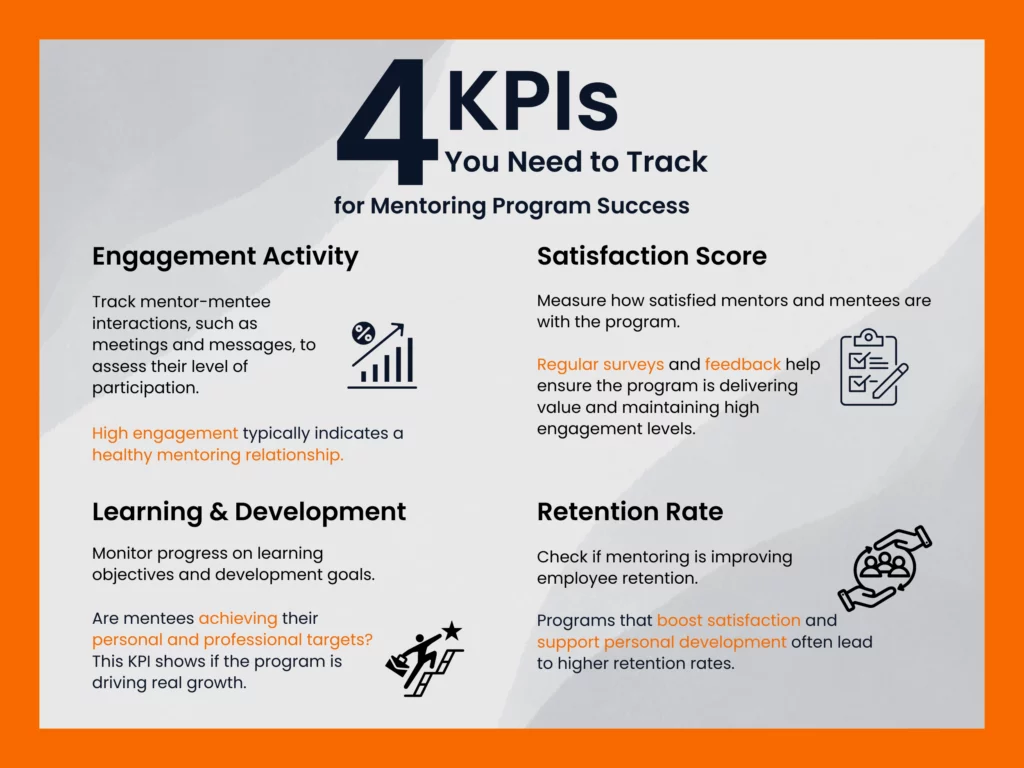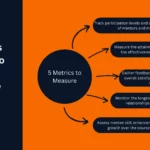
KPI’s of Mentoring Program to Measure
The basic goal of any mentoring is to achieve the objectives designed with success. After all the effort you have put, it’s fair for an organization to see results. How that the outcome is achieved? By measuring the program!
Measuring success isn’t as simple as it sounds. It’s pertinent to first figure out what to measure in mentoring programs. Regardless of the type of program it is, here are 4 basic KPIs that define success:
1. Satisfaction Score
Often, organizations build a checklist of the program and keep on following it without accessing if the employees are happy with the program are not. Quantifying employee satisfaction is critical to success.
The question is how to measure satisfaction? This can be done by communicating with the mentors and mentees and measuring the engagement. Other than this, you can also ask your employees if they are satisfied with the overall program. Don’t hesitate in asking for feedback on how to improve the program with surveys after the program is over.
The way of engaging users and asking for satisfaction feedback influences the results dramatically. If you ask for the feedback based on times and using traditional non-digital mentods, you will receive mixed feelings. We suggest to embed the feedback mechanism in the mentoring journey so that mentors and mentees can provide their feedback at the right time and location.
2. Engagement Activity
A proven outcome of a successful mentoring program is an improvement in engagement. Even during the mentorship, if the mentees are responding well and they are engaging and active, that means the program is on track.
If you are using a mentoring software, check the engagement activity log, and track the progress. The number of calls, sessions, and messages gives a fair idea of how much involved the mentees and how the mentors are addressing their concerns.
Mentorink provides huge pile of activity logs that are the footprints of mentors and mentees in the system. These data itself do not automatically mean anything but may be a very important basis for People Analytics to improve the program structure, communication channels and so on.
3. Learning & Development Targets
Another useful KPI for measuring a mentoring program is learning and development. Mentoring helps build confidence, improves communication, develop leadership, and other soft skills in both mentors and mentees.
When a mentee is partnered with the right mentor, the expertise exchanged improves learning to a great extent. The best way of measuring learning and development is to determine if the personal or business goals are met. These goals can be defined previously beforehand by setting clear expectations or created dynamically by pair to tracked in the whole mentorship.
If the goals are met, that is a clear indication that the program is successful in meeting its outcome so far. Organizations sometimes link mentoring activities with L&D courses and certification programs. This is also a very smart way to measure the learning and development success.
4. Retention Rate
An increase in retention rate is another indicator that the mentoring program is a success. If employee satisfaction among participation is high, you are likely to retain talent. Let’s say the purpose of the mentoring program is to build an inclusive culture or to focus on leadership. The outcomes include retention, engagement, and career progression.
Nevertheless, it is not so easy to track and trace and manage this metric. Of course it can be managed in several systems and spreadsheets but it is wise to invest once to integrate your HRIS system with the mentoring software so that you can have a healthy data flow between those. This invesments compansate itself if the number of participants in the mentoring programs is relatively high. We can consult on the best practices and how other organizations approach this topic.
Conclusion
It all starts with defining the goals and developing mentoring metrics. Here a mentoring software can really help. Choose the one that includes features such as:
- Surveys: Acquire feedback from the mentors and mentees via surveys throughout the program
- Analytics: For tracking the progress of the program with activity logs
- Reports: View real-time reports to analyze the reports and access the performance
Mentorink provides all these tracking and reporting modules and still flexible enough so that you can customize according to your organization’s need. Our team can explain and guide you how all these work and how Mentorink can do the heavy-lifting in the administration process.
Overall, in items of mentoring KPIs, it is recommended to have a baseline measurement before starting the program and measure this baseline for progress during and after the program. This makes it easier to measure the impact of the program.
Now that you know what to measure in mentoring programs, get started to measure the progress.


